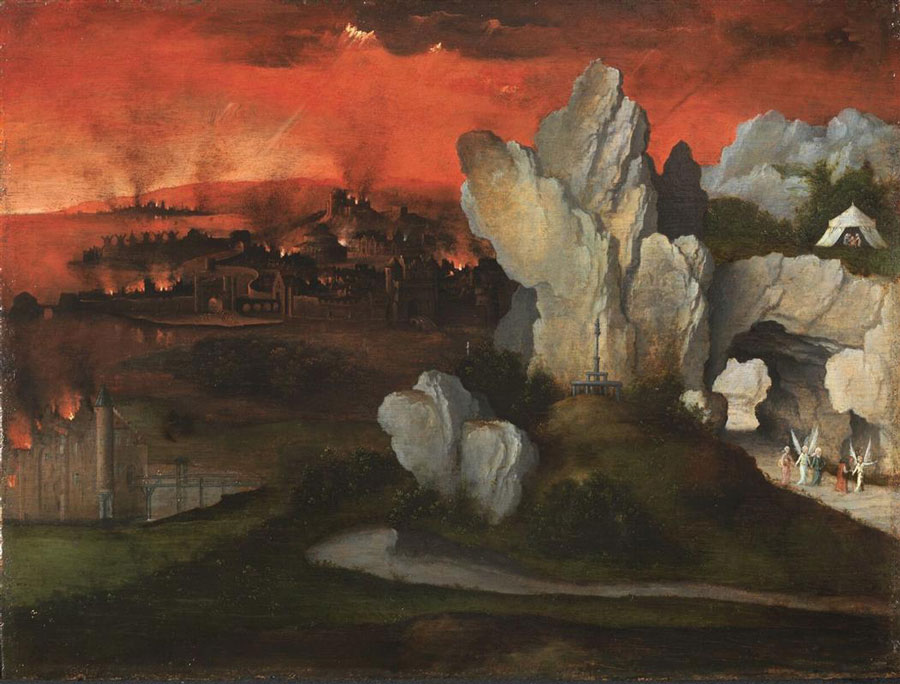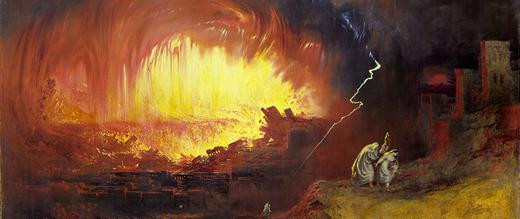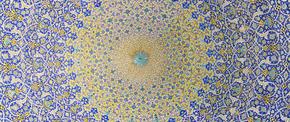The views expressed in our content reflect individual perspectives and do not represent the authoritative views of the Baha'i Faith.
If you search online, you will discover thousands of references to books with something to say about the symbolism of Sodom.
These books variously see Sodom as a clear-cut mandate to extend hospitality to strangers; a model of the lowest forms of sensory desire; a cautionary tale about the wages of sin; a physical description of the spiritual punishment in store for the wicked; an injunction against homosexuality; a comparison between the way in which the followers of God are expected to act and the way in which unbelievers behave; and a warning about what can happen to believers like Lot who make their home among the unrighteous. It has also been taken as a sign that only those who were physical descendants of Abraham would inherit the blessings of his Covenants with God: In spite of being a faithful believer, Lot was not a direct descendant of Abraham and thus not destined to be the founder of a tribe that would continue to pledge allegiance to the new revelation.
But another, more spiritually credible angle from which to view the incident of Sodom and Gomorrah is to understand it as an account of what can happen when a group of people accepts a religion in word but does not adhere to it in deed:
O People! The word must be demonstrated by the deed, for the righteous witness of the Word is action. The former without the latter shall not allay the thirst of the needy nor open the door of sight to the blind. – Baha’u’llah, Star of the West, Volume 1, p. 7.
From this perspective, the story looks back at history and also forward in prophecy, because the same kind of religious hypocrisy has occurred again and again during the last several thousand years. The angelic prophets and messengers represent the religions sent by God—such as the religion of Noah, the religion of Moses, and the religion of Jesus—while Sodom represents those who profess to be followers of these religions. When the angels examine the behavior of the Sodomites, it becomes obvious that although they pretend to be religious, they have been perverting the true intent of their faith.
Their perversion is indicated by their unnatural lust for the angels—they want to use the angels for their own purposes, rather than treat them with honor. When Lot tries to turn the Sodomites away from their perversions (i.e., he offers them the teachings of a new and pure Word of God, symbolized by his two virginal daughters), the men adamantly refuse to change their behavior. They are content with the way they are—disobedient to the old and heedless of the new. Their spiritual blindness means that they cannot see any reason to flee from the wickedness of disobedience, and so their annihilation (physical, spiritual, or both) is inevitable.

Landscape with the destruction of Sodom and Gomorrah by Joachim Patinir (c. 1520)
Warned by the angels, Lot gathers the members of his family together, and they leave Sodom just before its destruction. Lot’s wife, described by Muhammad as being false to her husband, bitterly resents having to leave the city where she has been happy. She turns and looks back in longing at the wickedness behind her, an act of disloyalty that freezes her into a pillar of salt.
The mystical implications of this crystalline image can be explored by examining the ways in which both the helpful and the harmful properties of salt are delineated in scripture. One of the first passages about salt that springs to mind is Jesus’ question: “Ye are the salt of the earth; but if the salt has lost his savour, wherewith shall it be salted?”
According to Abdu’l-Baha, Jesus is speaking about the dangers of the “dissensions and lack of unity among His followers,” pointing out that if the apostles—the “salt”—are not united, the delicious flavor of the work they do will be lost. There are several other Biblical verses that use salt as a metaphor for a quality that is desirable or of value, including this one from Matthew: “let your speech always be with grace, as though seasoned with salt, so that you will know how you should respond to each person.” – 5:13.
Muhammad uses images of salt in several ways, but one of the most intriguing is the manner in which he speaks of the spiritual realm and the material realm as twin oceans. One ocean contains fresh (spiritual) water, while the other is salty. Both oceans yield food and treasure, yet only the fresh water is sweet and pleasant to drink:
He hath let loose the two seas which meet each other… From each he bringeth up pearls both great and small… Nor are the two seas alike: the one fresh, sweet, pleasant for drink, and the other salt, bitter; yet from both ye eat fresh fish, and take forth for you ornaments to wear… – Qu’ran 35:13; 55:19-32.
The Baha’i teachings employ the same contrast between fresh and salt water to demonstrate the foolishness of rejecting the sweetness of spirituality in favor of the bitterness of materialism:
Yea, inasmuch as the peoples of the world have failed to seek from the luminous and crystal Springs of divine knowledge the inner meaning of God’s holy words, they therefore have languished, stricken and sore athirst, in the vale of idle fancy and waywardness. They have strayed far from the fresh and thirst-subduing waters, and gathered round the salt that burneth bitterly. – Baha’u’llah, The Book of Certitude, p. 105.
Applying all these examples from scripture to Lot’s wife, she becomes the salt that has lost its savor. She is in disunity with religious truth, because she is more attached to the treasures of the salty sea, epitomized by Sodom, than she is to the fresh truths brought by Abraham and preached by her husband. She refuses to drink from the nourishing, life-giving “crystal Springs of divine knowledge” and wishes only to immerse herself in the bitter ocean of physical existence, a wish that causes her to become so encrusted with its sediment that she is spiritually immobilized.
You May Also Like
Comments

















I had never read the Quran's version of this story. Thank-you for contributing these insights.
Sam